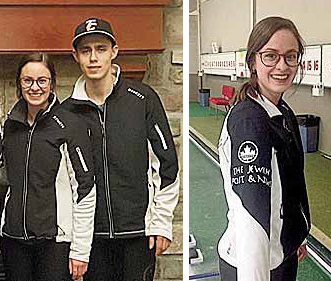Local News
Former nominee for Jewish Athlete of the Year and Canadian Junior Curling champion Kyle Doering is the new general manager of the Granite Curling Club

By BERNIE BELLAN When I was doing a search for Kyle Doering’s name in the Jewish Post archives I discovered that Kyle’s name was actually first mentioned in our paper back in 2003 when he was a student in the Hebrew Bilingual program at Margaret Park School. Kyle, who was then in Grade 2 in the Hebrew bilingual program at that school, had written an explanation why we eat hamentashen on Purim – which was published in a March 2003 issue. (Kyle says that following his completion of the Hebrew program at Margaret Park after Grade 6, he did continue in the Hebrew program at H.C. Avery School until the end of Grade 8.)
Now – in an effort to emulate the style of the late, great Harvey Rosen (and maybe Gerry Posner as well), both of whom would never have missed an opportunity to take an extreme leap from one unrelated subject to another – as both those guys might have written: “It’s not too far a leap to say that a curling rock could be compared to a hamentash!”
And, to further emulate the writing style of both Harvey and Gerry, let me say that Kyle, who is of the “Hebraic persuasion” (as Harvey used to say) – on his mother’s side, has used some of the genes he inherited from his businessman grandfather, the late Bill LIfchus (who used to write a very amusing financial column for the Jewish Post), has now carved a career for himself using the degree in business he acquired from the University of Winnipeg in 2019 to become the general manager of Winnipeg’s oldest, and one of its largest curling clubs: the Granite Curling Club.
A further search of Kyle’s name in our archives reveals that he has been a finalist for Jewish Athlete of the Year twice, including last year, when he was the fifth for Canadian Brier champion Brad Gushue. Kyle had also been nominated in 2017 after his junior team won the Canadian championship and placed third in the world junior championship. (Kyle was also the fifth for Reid Carrothers’ Manitoba team this year.)
Following high school Kyle entered the University of Winnipeg, where he graduated with a business degree in 2019. All the while though he remained a very competitive curler. As a matter of fact, in 2016 I happened to run into Kyle at the Granite club one afternoon (where I am also a member). Kyle was practising mixed curling with his then-girlfriend, Ashely Groff. (Kyle and Ashley actually met at the Granite in 2016, Kyle tells me – when they were curling on separate sheets of ice. They were married just this past December.)

Right: Ashley showing her sleeve with their sponsor’s name (and I never asked them to do that!)
During the course of that conversation in 2016 Kyle asked me whether I would consider sponsoring Ashley and him as mixed curlers? I asked him how much it would cost? He said: “$200” – which was far less than what I was expecting him to say, so I readily agreed.
What I didn’t expect though was that Kyle and Ashley would put the name “The Jewish Post& News” on their curling jackets. That was by far the cheapest form of advertising I have ever encountered!
Upon completion of his business degree at the University of Winnipeg, Kyle went to work for the Humane Society as its community relations officer, where he was employed up until the time he was hired as the Granite’s new general manager.
Kyle wasn’t given the job simply because he’s got such a strong background in curling though. He was among several candidates for the job and did go through an interview process, following which he was told he had been selected for the position.
For Kyle, it’s a dream position. As he says: “I can work in curling – which I love…and in this historic building and club (the Granite is 140 years old) – which has given me so much over the years. I met my wife here, learned to curl here…it’s very cool to get to manage it.”
Readers may be aware that the Granite Curling Club has been in the news a fair bit lately – but not for anything to do with curling, per se. The club is actually situated on land owned by the City of Winnipeg. (It’s a fairly complicated story how that came to be. At one time the Granite owned the land where the club is situated, but it ran into financial difficulty in the 1970s and was forced to sell the property to the city with a “lease back” arrangement.)
The city is currently in the process of redeveloping land on the west side of the club where a parking lot now exists for the purpose of building affordable housing. Most of the spaces in that parking lot are leased out to Canada Life, but the Granite has had 30 parking spaces allocated for members’ use. There is now a proposal to build a 12-storey apartment building on the parking lot. The loss of those 30 parking spaces is of great concern to many members of the Granite Curling Club.
It is into the midst of this imbroglio that Kyle Doering now finds himself. On a personal note I myself contacted the city councillor for the area, Sherry Rollins (who, by the way, also is Jewish), and a spokesperson for Canada Life. There doesn’t seem to be an easy way out to resolve the parking situation – and the future existence of the Granite Curling Club is in peril unless some sort of accommodation can be reached insofar as parking spaces for members are made available.
Kyle may be adept at putting a curling stone on to the button of a sheet of ice, but having stepped in as the brand new general manager of a curling club that has over 1300 members, he may find that the challenges that lie ahead are more than one might have expected just a few short months ago – when the city took the club by surprise when it announced its plan to develop the land where, until now, Granite curlers have been able to park their cars.
Local News
Winnipeg Jewish Theatre breaks new ground with co-production with Rainbow Stage

By MYRON LOVE Winnipeg Jewish Theatre is breaking new ground with its first ever co-production with Rainbow Stage. The new partnership’s presentation of “Fiddler on the Roof” is scheduled to hit the stage at our city’s famed summer musical theatre venue in September 2026.
“We have collaborated with other theatre companies in joint productions before,” notes Dan Petrenko, the WJT’s artistic and managing director – citing previous partnerships with the Segal Centre for the Performing Arts in Montreal, the Harold Green Jewish Theatre in Toronto, Persephone Theatre in Saskatoon and Winnipeg’s own Dry Cold Productions. “Because of the times we’re living through, and particularly the growing antisemitism in our communities and across the country, I felt there is a need to tell a story that celebrates Jewish culture on the largest stage in the city – to reach as many people as possible.”
Last year, WJT approached Rainbow Stage with a proposal for the co-presentation of “Fiddler on the Roof.” Rainbow Stage management was really enthusiastic in their response, Petrenko reports.
“We are excited to be working with Winnipeg’s largest musical theatre company,” he notes. “Rainbow Stage has an audience of more than 10,000 people every season. Fiddler is a great, family-oriented story and, through our joint effort with Rainbow Stage, WJT will be able to reach out to new and younger audiences.”
“We are also working to welcome more diverse audiences from other communities, as well as newcomers – families who have moved here from Israel, Argentina and countries of the former Soviet Union.”
Helping Petrenko to achieve those goals are two relatively new and younger additions to WJT’s management team. Both Company Manager Etel Shevelev, and Head of Marketing Julia Kroft are in their 20s – as is Petrenko himself.
Kroft, who is also Gray Academy’s Associate Director of Advancement and Alumni Relations, needs little or no introduction to many readers. In addition to her work for Gray Academy and WJT, the daughter of David and Ellen Kroft has been building a second career as a singer and actor. Over the past few years, she has performed by herself or as part of a musical ensemble at Jewish community events, as well as in various professional theatre productions in the city.
Etel Shevelev is also engaged in a dual career. In addition to working full time at WJT, she is also a Fine Arts student (majoring in graphic design) at the University of Manitoba. Outside of school, she is an interdisciplinary visual artist (exhibiting her work and running workshops), so you can say the art world is no stranger to her.
(She will be partcipating in Limmud next month as a member of the Rimon Art Collective.)
Shevelev grew up in Kfar Saba (northeast of Tel Aviv). She reports that in Israel she was involved in theatre from a young age. “In 2019, I graduated from a youth theatre school, which I attended for 11 years.” In a sense, her work for WJT brings her full circle.
She arrived in Winnipeg just six years ago with her parents. “I was 19 at the time,” she says.
After just a year in Winnipeg, her family decided to relocate to Ottawa, while she chose to stay here. “I was already enrolled in university, had a long-term partner, and a job,” she explains. “I felt that I was putting down roots in Winnipeg.”
Etel expects to graduate by the end of the academic year, allowing her to focus on the arts professionally full-time.
In her role as company manager, Shevelev notes, she is responsible for communications with donors, contractors, and unions, as well as applying for various grants and funding opportunities.
In addition, her linguistic skills were put to use last spring for WJT’s production of “The Band’s Visit,” a story about an Egyptian band that was invited to perform at a cultural centre opening ceremony in the lively centre of Israel, but ended up in the wrong place – a tiny, communal town in southern Israel. Shevelev was called on to help some of the performers with the pronunciation of Hebrew words and with developing a Hebrew accent.
“I love working for WJT,” she enthuses. “Every day is different.”
Shevelev and Petrenko are also enthusiastic about WJT’s next production – coming up in April: “Ride: The Musical” debuted in London’s West End three years ago, and then went on to play at San Diego’s Old Globe theatre to rave reviews. The WJT production will be the Canadian premiere!
The play, Petrenko says, is based on the true story of Annie Londonderry, a young woman – originally from Latvia, who, in 1894, beat all odds and became the first woman to circle the world on a bicycle.
Petrenko is also happy to announce that the director and choreographer for the production will be Lisa Stevens – an Emmy Award nominee and Olivier Award winner. (The Olivier is presented annually by the Society of London Theatre to recognize excellence in professional London theatre).
“Lisa is in great demand across Canada, and the world really,” the WJT artistic director says. “I am so thrilled that we will be welcoming one of the greatest Jewish directors and choreographers of our time to Winnipeg this Spring.”
For more information about upcoming WJT shows, readers can visit wjt.ca, email the WJT office at info@wjt.ca or phone the box office at 204-477-7515.
Local News
Rising Canadian comedy star Rob Bebenek to headline JCFS’ second annual “Comedy for a Cause”

By MYRON LOVE Last year, faced with a federal government budget cut to its Older Adult Services programs, Jewish Child and Family Service launched a new fundraising initiative. “Comedy with a Cause” was held at Rumor’s Comedy club and featured veteran Canadian stand-up comic Dave Hemstad.
That evening was so successful that – by popular demand – JCFS is doing an encore. “We were blown away by the support from the community,” says Al Benarroch, JCFS’s president and CEO.
“This is really a great way to support JCFS by being together and having fun,” he says.
“Last year, JCFS was able to sell-out the 170 tickets it was allotted by Rumor’s,” adds Alexis Wenzowski, JCFS’s COO. “There were also general public attendees at the event last year. Participants enjoyed a fun evening, complete with a 50/50 draw and raffle. We were incredibly grateful for those who turned out, the donors for the raffle baskets, and of course, Rumor’s Comedy Club.
“Feedback was very positive about it being an initiative that encouraged people to have fun for a good cause: our Older Adult Services Team.”
This year’s “Comedy for a Cause” evening is scheduled for Wednesday, February 25. Wenzowski reports that this year’s featured performer, Rob Bebenek, first made a splash on the Canadian comedy scene at the 2018 Winnipeg Comedy festival. He has toured extensively throughout North America, appearing in theatres, clubs and festivals. He has also made several appearances on MTV as well as opening shows for more established comics, such as Gerry Dee and the late Bob Saget.
For the 2026 show, Wenzowski notes, Rumors’ is allotting JCFS 200 tickets. As with last year, there will also be some raffle baskets and a 50/50 draw.
“Our presenting sponsors for the evening,” she reports, “are the Vickar Automotive Group and Kay Four Properties Incorporated.”
The funds raised from this year’s comedy evening are being designated for the JCFS Settlement and Integration Services Department. “JCFS chose to do this because of our reduction in funding last year by the federal government to this department,” Wenzowski points out.
“Last year alone,” she reports, “our Settlement and Integration Services team settled 118 newcomer families – from places like Israel, Mexico, Brazil, and Argentina. Each year, our program supports even more newcomer families with things like case management, supportive counselling, employment coaching, workshops, programming for newcomer seniors, and more.”
“We hope to raise more than $15,000 through this event for our Settlement and Integration Program,” Al Benarroch adds. “The team does fantastic work, and we know that our newcomer Jewish families need the supports from JCFS. I want to thank our sponsors, Rumor’s Comedy Club, and attendees for supporting us.”
Tickets for the show cost $40 and are available to purchase by calling JCFS (204-477-7430) or by visiting here: https://www.zeffy.com/en-CA/ticketing/jcfs-comedy-for-a-cause. Sponsorships are still available.
Local News
Ninth Shabbat Unplugged highlight of busy year for Winnipeg Hillel

By MYRON LOVE Lindsay Kerr, Winnipeg’s Hillel director, is happy to report that this year’s ninth Shabbat UnPlugged, held on the weekend of January 9-11, attracted approximately 90 students from 11 different universities, including 20 students who were from out of town.
Shabbat UnPlugged was started in 2016 by (now-retired) Dr. Sheppy Coodin, who was a science teacher at Gray Academy, along with fellow Gray Academy teacher Avi Posen (who made aliyah in 2019) – building on the Shabbatons that Gray Academy had been organizing for the school’s high school students for many years.
The inaugural Shabbat UnPlugged was so successful that Coodin and Posen did it again in 2017 and took things one step further by combining their Shabbat UnPlugged with Hillel’s annual Shabbat Shabang Shabbaton that brings together Jewish university students from Winnipeg and other Jewish university students from Western Canada.
As in the past, this year’s Shabbat UnPlugged weekend was held at Lakeview’s Hecla Resort. “What we like about Hecla,” Kerr notes, “is that they let us bring in our own kosher food, it is out of the city and close to nature for those who want to enjoy the outdoors.”
The weekend retreat traditionally begins with a candle lighting, kiddush and a traditional Shabbat supper. Unlike previous Shabbats UnPlugged, Kerr points out, there were no outside featured speakers this year. All religious services and activities were led by students or national program partners.
The weekend was funded in part by grants from CJPAC and StandWithUs Canada, along with the primary gift from The Asper Foundation.
Kerr reports that the activities began with 18 of our local Jewish university students participating in a new student Shabbaton – inspired by Shabbat Unplugged, titled “Roots & Rising.”
In addition to Shabbat Unplugged, Hillel further partnered with Chabad for a Sukkot program in the fall, as well as with Shaarey Zedek Congregation and StandWithUs Canada for a Chanukah program. Hillell also featured a commemoration of October 7, an evening of laser tag and, in January, a Hillel-led afternoon of ice skating.
Coming up this month will be a visit to an Escape Room – and a traditional Shabbat dinner in March.
Kerr estimates that there are about 300 Jewish students at the University of Manitoba and 100 at the University of Winnipeg.
“Our goal is to attract more Jewish students to take part in our programs and connect with our community,” she comments.




